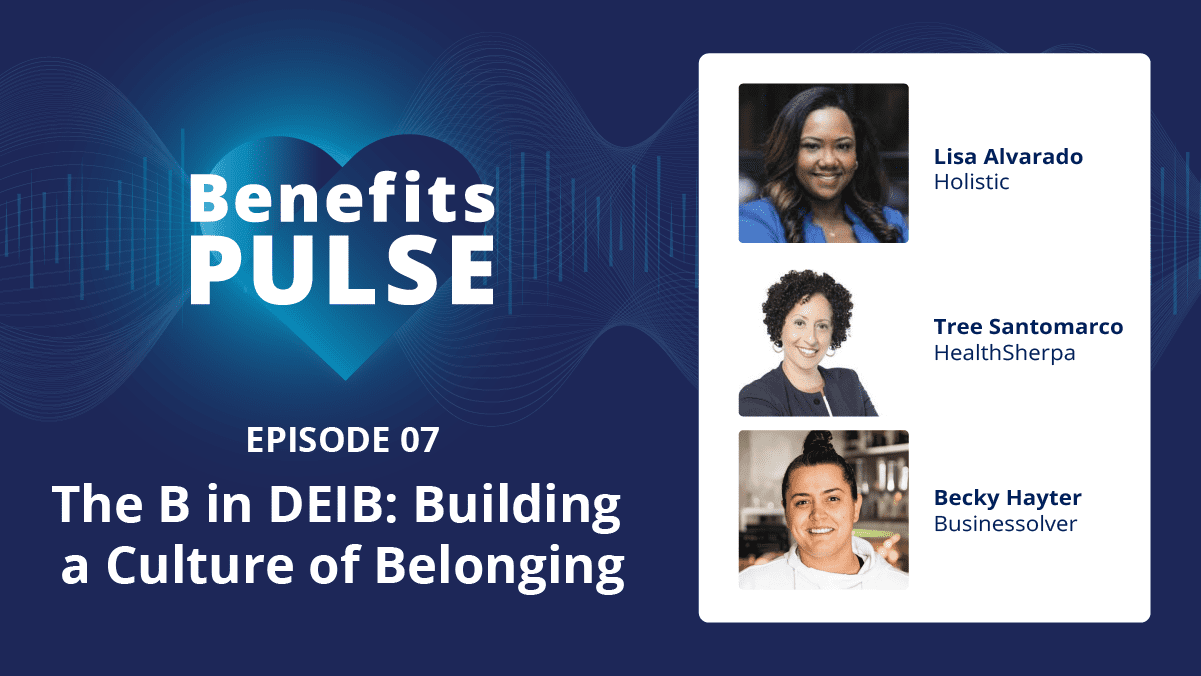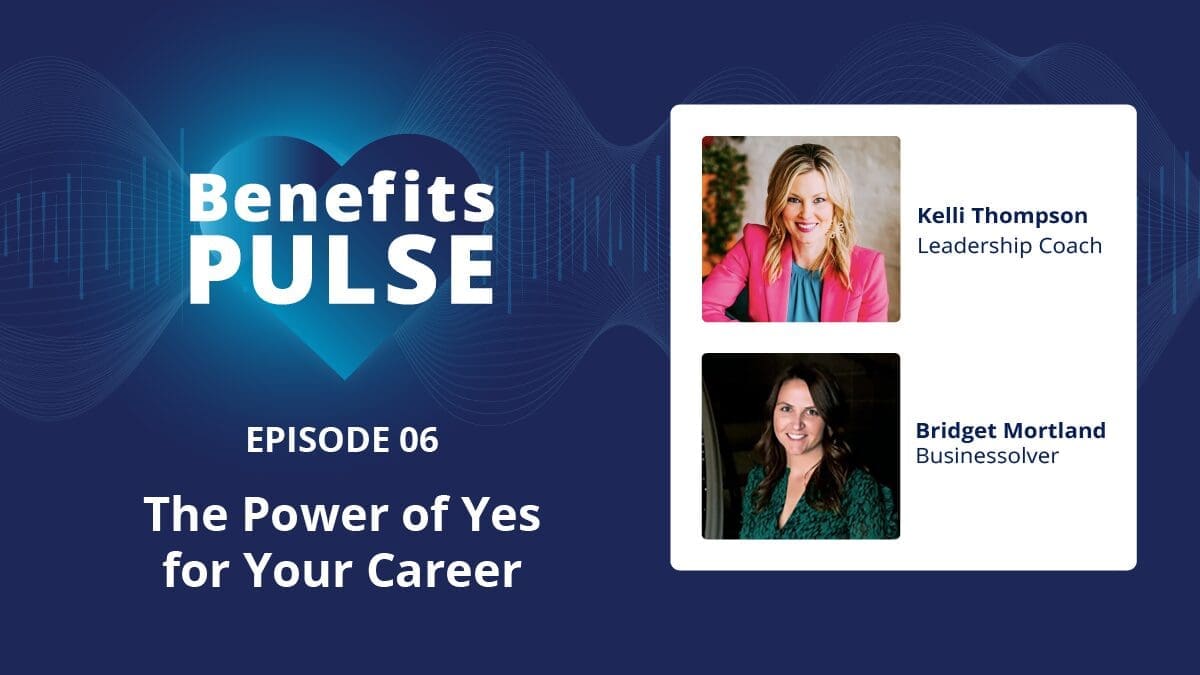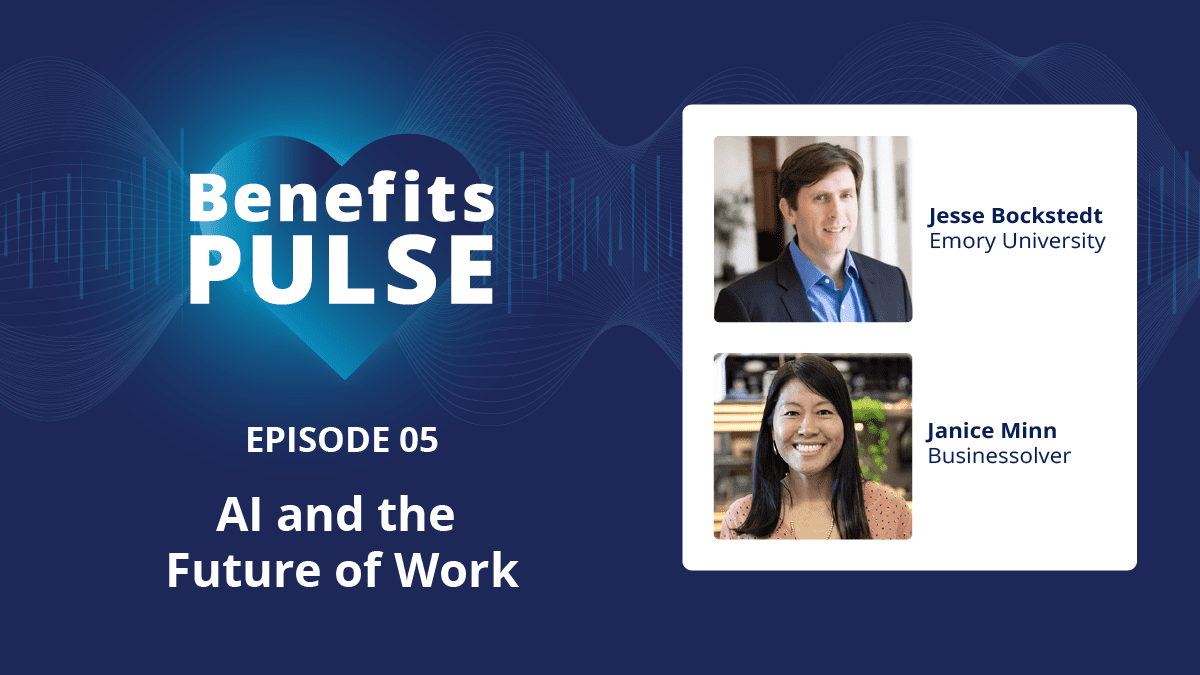Compassionate Competence
About the Episode
There’s customer service and then there’s compassionate, competent service. Rae Shanahan, Businessolver’s Chief Strategy Officer, speaks with Jefferey Becker, Businessolver’s Senior Member Advocate, about the concept of compassionate competence, an ethos he’s brought into his role as a member advocate as a means to delivering empathy in the moments it matters most.
Transcript
Rae Shanahan:
Thank you for taking time to spend with me today.
Jefferey Becker:
You’re welcome.
Rae:
I’m Ray Shanahan, chief Strategy officer.
I’m going on over 23 years here and I had the good fortune of spending time with you in new hire class, what, when you started in early 2019?
Jefferey:
Yes.
Rae:
So, I’d love to kick off Jeffrey. One, how did you end up at Businessolver?
Jefferey:
I had been working for another organization that did benefits administration prior, and there was actually a group of us they had not chosen to hire the people that we were with, so I was looking for a similar position and I went to a place that was indicating that Businessolver was looking for hiring representatives.
So I think there was five, maybe six of us came over to Businessolver and to my knowledge, all but one of us are actually still working with Businessolver.
Rae:
Oh my gosh. That’s awesome. That’s awesome.
So I remember doing our new hire class and then a few weeks later I got an email from you with the heading of Compassionate Competence, and I keep this copy with me all the time.
So talk to me about what inspired you to send me the message and the note about compassionate competence.
Jefferey:
We had been going through extensive training, and especially I had been trying to make sense of the widgets because that’s where all the knowledge base is. Yeah. And, and Nancy had been training me with that, and over one weekend it all clicked. It’s hard to explain otherwise, but it was also a fruition of, I’ve been in various other positions where I’ve been helping people over the course of a lifetime.
So, I was sitting looking at the widgets and realizing how all this intermingled in terms of helping people and providing them with the correct information but doing it in a way that was not just mechanical, but had the kind of heart we’re talking about with and, honestly, God just enabled me to write this out over the course of a weekend.
I had sent it along to Nancy as my trainer, and then when we had that new hire class, she suggested passing it along to you.
So it’s really a fruition of a, of a lifetime, just distilled in helping people in various ways filtered through the tech with heart of Businessolver.
Rae:
I love it. I love it.
So, what does tech with heart mean to you?
Jefferey:
Well, tech with heart and I with the compassionate competence, and I thought about the tech part, if you will, is where the competence comes into play, because if I really want to help you, but I can’t, we could have a great conversation, but you’re not gonna get anything out of it.
So the competence has to be there in order for me to actually be able to solve your problems, which is why they call us Solvers.
But the flip side to that is if I’m really good with the technology, and so I’m very competent, but I don’t care that much about who you are, why you’re calling, what we need to do for you—if I’m lacking that empathy—then it’s going to be a really stilted interaction and I may miss things.
So the compassionate part would be, if you will, the heart and the competence part would be the tech and the two mesh together, I think, very well.
Rae:
I love it. I love it.
One of my favorite parts of your letter and, and you know, I’m sure anybody listening to this can get a copy of it, but that you talked about the romance in the call center and that, you know, every call is like, it’s a new person you might get to date and get to know.
Talk to me about what that means to you.
Jefferey:
Yes.
Well, I was thinking about this, and I’m gonna use some hand motions here. I hope they show properly. So if you have people and they contact you, it might be like they’re looking across at each other across the table or a desk or whatever the case may be.
That’s not necessarily a bad interaction, but there’s a distance there and so you’re not quite sure what they’re going to get out of it.
The idea of compassion, one of the root meanings of the word is that a person’s coming alongside in order to assist, in order to empathize with the person.
So, you come alongside, you’re together with them, and then that way you enter into what they’re going through ideally, just to anticipate where you go with the interaction.
Not only is it not like this, which looks more say mechanical and transactional.
This is going to be more relational. It’s going to be more of an empathetic experience so that the two of you together are going to be able to solve whatever situation needs.
Rae:
I love it because what empathy is really about is meeting someone where they are, and then compassion, like you said it, that’s really the movement, that’s the action of putting empathy into action. So, I love the way that you, I love your hand motions.
So, do you have a favorite interaction since you’ve been with us? You know, going on five years, you’ve taken probably thousands of calls and had thousands of interactions. So does anything stick out?
Jefferey:
One of them would be assisting surviving spouses. You have individuals here who, first of all, they’re bereaved.
And so you really want to be gentle with them and let them know that they have your sympathies.
Sometimes, honestly, in these calls, there can be tears just because of the caliber of their experience.
Many of the spouses, unfortunately might not have access to the information. They might not know how to submit a claim. They might not know what the eligible benefits are for them. They may not even know how to submit a document. And so, what we can do is, is work with these surviving spouses.
I’m thinking of a couple in particular where they may have a visual impairment, so it’s going to be hard for them to see. And so we can as function as their eyes. Some of them don’t have computer access. Which for whatever reason, they’re just not able to do it that way.
So at Businessolver, we can function as their hands and we can say, this is how you can submit your document. We can process your enrollment for you during the call, if necessary.
And they want to get onto the website, we can assist them in logging in and all those sorts of things.
We can walk them through the process of submitting their claims, making sure that they know each step of the way.
And I’ve had this with people where, as a consistent point of contact, we would reach out to the actual surviving spouse and say, this is what your benefits are. Do you have questions? Do you need help submitting your claims? And just in general letting them know that they’re not alone in this process, even as a surviving spouse.
Rae:
Thank you for doing that. And, those have to be really, really tough calls.
I also wanna spend a minute more on tech with heart.
So, I think about pre-pandemic. We are very much an office-centric organization. The only positions that would be remote were really sales-related positions or some of our service positions. But, you know, our member advocates roles, you know, everybody was in the office taking calls and you know, March 16th, 2020 was the day we sent pretty much everyone home.
But there were a few people that we still gave an option if they, you know, still wanted to come into the office, you could. And I think you were one of those that said, I gotta be in the office.
And I’m telling you, Jeffrey, me too at first.
So first few weeks into the pandemic, I would still go into the office. Old school, I was always trained to just gotta be there to focus. And I know that you stayed in the office for a little while, but then you had an opportunity to consider going remote.
So talk to me about that transition to moving back to Pennsylvania and are advocates able to really still provide compassionate competence from their homes?
Jefferey:
Absolutely. So we had moved to Iowa back in 2019 because my son and his family, we were just in the position of having five grandchildren.
So they asked for help and we wanted to help them. Love will sacrifice for that. And so we came out to Iowa in 2019, was in the office just about a year when the pandemic hit.
And thankfully Businessolver was able to let me stay in office because I’m just a being in an office kind of guy. I am older than most of the representatives, and so I appreciated that opportunity. However, I was born in Pennsylvania and my son was born in Pennsylvania.
And so when the opportunity arose for all of us, which are now six grandchildren, nine and under, to be able to go back to Pennsylvania, we moved back in the summer of 2022.
And I can testify that it has been a seamless transition. The support is there through our Teams chat, through our leadership. Being able to reach out to even CSLs and other people involved with our accounts. We can always get the contact and support that we need.
And it has also enabled us to have a much wider span of individuals that we can work with nationally. So, I’m very thankful for being able to extend compassionate competency even remotely.
Rae:
I love it. Yeah, it’s incredible even when we, you know, are hiring all of our advocates, really all positions, but our advocates all remotely, the talent that we’re able to hire has just been, it’s been fascinating and people that want to be in service.
I know I hate it when people say, well, the call center job is an entry-level position.
No it’s not. It’s one of the most important positions because you’re taking care of our clients, their employees, those are real people and benefits are confusing.
So do you have other advice for advocates on how they can use compassionate competence?
Jefferey:
One thing I would think of is remember that each interaction, you’re not dealing primarily with a call. You’re dealing with a person.
And so you want to look at it holistically as I’m dealing with an entire person, usually their family and the situation. And so it keeps it from being, again, a mechanical transactional interaction that you can relate to the person.
So it’s always not just a call, it’s an actual person.
Second thing I would think of in that regard is for, I think anyone in customer service, we’ve been on the other side of that interaction. We’ve made those phone calls, we’ve been on this side of the desk or the counter, whatever the case may be.
And we understand what it’s like to get delightful customer service or to get customer service that wasn’t so delightful. So we want to employ the golden rule in this, we want to make sure that they realize we’re going to treat them the way they want to be and should be treated and that we’ll spend the time to exert the amount of effort.
It’s not just going to be, try to get them off the phone as quickly as possible.
If it takes extended conversations, if it takes numerous interactions, we are willing to do that, because we want to delight our members and make sure that their situation is resolved and to show them that kind of compassionate competence and that tech with heart.
The other thing I would say is always remember, put yourself in their shoes. At other times in other places, you were that person. And so treat them the way you would wanna be treated.
Rae:
I love it. I love it. I love it.
Anything else you wanna leave us with?
Jefferey:
I’m just very thankful for the opportunity, again, to work with Businesssolver.
I have thoroughly enjoyed being a part of this wonderful organization. Everyone from Rae and Jon down to all of my peers has been exceptional.
And I would just encourage anyone, if you can be a part of Businessolver, please join us. We would love to have you.
Rae:
What a great way to wrap the, this interview. Jeffrey, thank you so much for all that you have done, and thank you for being a Solver.
Jefferey:
Thank you. It’s my pleasure.



